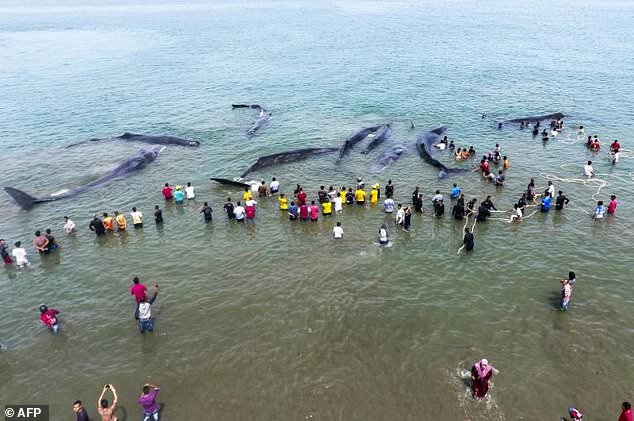Empat Paus Sperma Gagal Diselamatkan setelah Terdampar di Aceh
Four Sperm Whales Die in Indonesia Beach Rescue
Editor : Ismail Gani
Translator : Novita Cahyadi

EMPAT EKOR paus sperma yang terdampar di sebuah pantai di Aceh mati pada Selasa, meskipun ada upaya penyelamatan untuk menyelamatkan mamalia raksasa tersebut.
Paus yang terdampar berjumlah 10 ekor yang ditemukan oleh penduduk setempat setelah terdampar di sepanjang pantai Ujong Kareng, Kecamatan Mesjid Raya, Aceh Besar, Aceh, pada Senin (13/11) dan seekor paus berada jauh dari kawanan paus.
Tim penyelamat mencoba mendorong sembilan ikan paus yang terdampar itu kembali ke laut karena ratusan warga setempat berdatangan untuk melihat, beberapa mengambil foto paus.
Lima paus berhasil didorong ke tengah laut dan mampu bertahan hidup namun empat ekor mati, beberapa ekor mati dengan mulut ternganga saat gelombang laut menabrak tubuh raksasa mereka.
Tim penyelamat mengikatkan tali ke ekor beberapa mamalia untuk menarik mereka ke air yang lebih dalam.
"Kami mendapat masalah untuk mengevakuasi karena kurangnya pengalaman dan peralatan," kata Kepala Badan Konservasi Alam Aceh Sapto Aji Prabowo.
"Namun ini menjadi pelajaran penting bagi kami khususnya Aceh yang menjadi titik persimpangan untuk mamalia laut sehingga ke depan kami dapat lebih siap menghadapi situasi seperti ini."
Otopsi resmi akan dilakukan pada paus untuk menentukan penyebab kematian, namun Sapto mengatakan bahwa makhluk-makhluk abu-abu raksasa tersebut mungkin telah mengikuti pemimpin mereka ke pantai atau tersesat.
"Biasanya, paus sperma akan menghindari masuk ke air dalam jika mereka sakit, dua di antaranya sakit, jadi diasumsikan pimpinan kawanan paus sakit dan yang lainnya langsung mengikuti ke pantai," kata Prabowo.
Satu paus memiliki luka yang menandakan telah terluka oleh terumbu karang, katanya, seraya menambahkan bahwa keempat ekor ikan yang mati tewas akan dikubur di dekat pantai.
Ini adalah kedua kalinya dalam beberapa tahun terakhir bahwa paus sperma telah ditemukan terdampar di pulau Sumatra bagian utara, ditemukan tewas di pantai Banda Aceh pada tahun 2016 seperti dikutip AFP yang dilansir MailOnline.
FOUR SPERM whales stranded on a beach in Indonesia have died, a local official said Tuesday, despite frantic efforts to save the massive mammals.
The whales were among a pod of 10 spotted by locals stranded along Ujong Krueng beach in Aceh province Monday, with one seen farther out in the water.
Rescuers tried to push the nine beached whales back out to sea as hundreds of curious locals looked on, some snapping pictures.
Five were pushed back and survived but four died, some with their mouth agape as small waves crashed over their giant bodies.
Rescuers tied ropes to the tails of some of the mammals to pull them to deeper water.
"We had problems evacuating them due to a lack of experience and equipment," Aceh nature conservation agency head Sapto Aji Prabowo told AFP.
"But this is a good lesson for us because Aceh is a crossing point for marine mammals so in the future we should be prepared to deal with situations like this."
An official autopsy will be conducted on the whales to determine the cause of death, but Prabowo said the giant gray creatures may have followed their leader to shore or lost their way.
"Usually, sperm whales will avoid going into deep water if they're sick. Two of them were sick. So, we assume the leaders were sick and the others automatically followed them to the beach," Prabowo said.
One whale had wounds that suggested it had been injured by a coral reef, he said, adding that the four dead will be buried close to the beach.
This is the second time in the last few years that sperm whales have been found beached in northernmost Sumatra island, with one found dead on a beach in Banda Aceh in 2016.
Also last year, eight pilot whales died after a mass stranding on the coast of Indonesia's main island of Java.
They were among a group of more than two dozen short-finned pilot whales that had come ashore during high tide.















